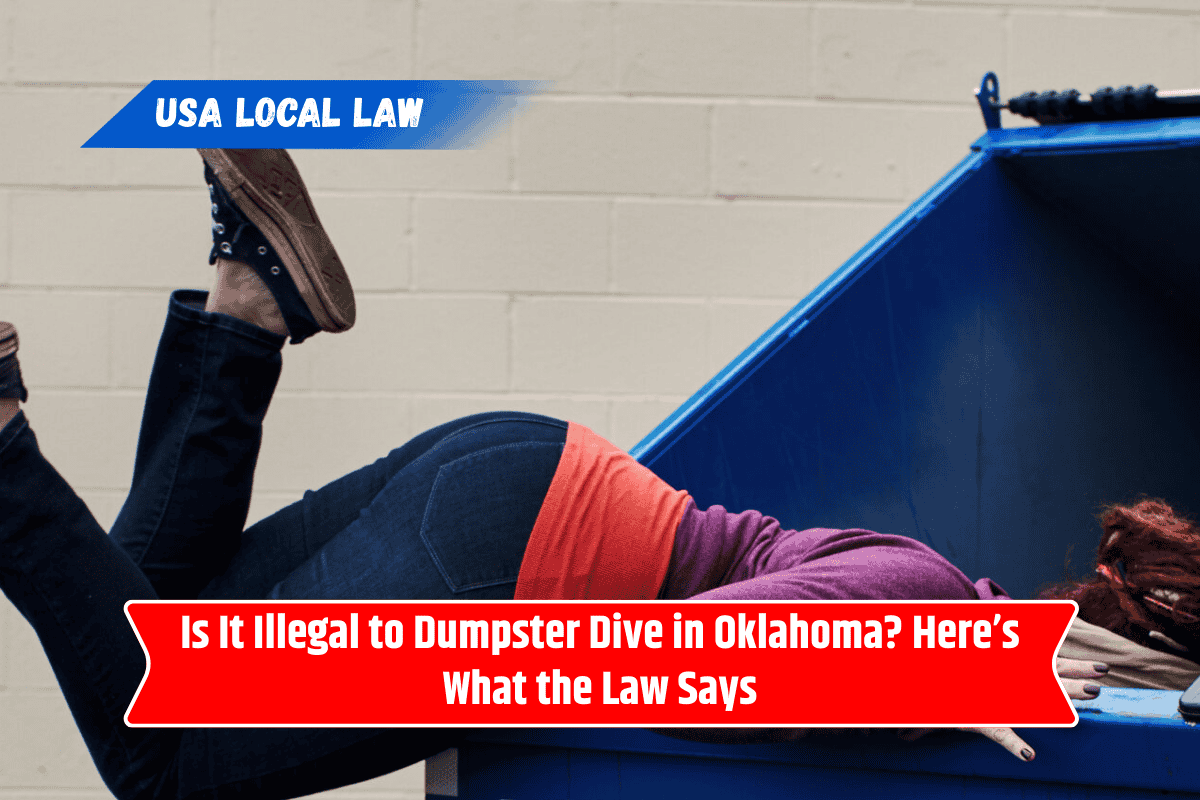Dumpster diving, the act of searching through commercial or residential trash for discarded items, is a practice that raises both ethical and legal questions. While it might seem like an easy way to salvage useful items, many people wonder if dumpster diving is illegal, especially in Oklahoma.
As with many legal matters, the answer is nuanced, and whether or not dumpster diving is prohibited depends on various factors such as location, intent, and local ordinances.
1. Oklahoma State Law on Dumpster Diving
Under Oklahoma state law, there is no specific law that makes dumpster diving inherently illegal. However, dumpster diving can lead to legal issues under other statutes, including trespassing and theft laws.
When it comes to searching through private property, the key issue is whether you are on public or private land and whether you have permission to access the property.
2. Trespassing Laws in Oklahoma
One of the most common legal problems associated with dumpster diving is trespassing. In Oklahoma, if you are diving in a dumpster located on private property, such as in the back of a store, apartment complex, or someone’s home, you could be charged with trespassing.
Trespassing laws in Oklahoma prohibit entering or remaining on someone’s property without their consent, including unauthorized access to areas like dumpsters.
If a property owner posts a “No Trespassing” sign or takes other reasonable measures to restrict access, it strengthens the case for trespassing charges. If you are caught diving in dumpsters on private property without permission, you could be cited or arrested for trespassing.
3. Theft and Property Laws
Another concern with dumpster diving in Oklahoma is the issue of theft. Even though items in a dumpster might be discarded, they are still considered the property of the owner of the dumpster (such as the business, property owner, or municipality).
Taking something from a dumpster without permission can potentially be classified as theft.
For example, if the dumpster contains materials or goods that are still valuable or that have not yet been officially discarded by the owner, removing those items could be seen as stealing. Additionally, if you’re taking items from a commercial dumpster, businesses may consider it an illegal removal of company property.
4. Municipal Ordinances and Local Laws
While Oklahoma state law does not specifically address dumpster diving, many cities and counties have local ordinances that may make it illegal. These ordinances can vary greatly depending on where you are in the state. Some common municipal regulations include:
Prohibitions against scavenging: Some cities may have rules against scavenging through commercial or residential trash bins, even if the property is not strictly private.
Environmental and sanitation codes: Some local codes may regulate trash disposal and waste management, which could extend to limiting access to dumpsters for health and sanitation reasons.
Permit requirements: In some areas, you may need a permit or permission to access commercial dumpsters, particularly in areas where it is considered a safety or health risk.
For example, in Oklahoma City, while there may not be an outright ban, local waste management codes can regulate access to dumpsters, and individuals who are caught diving in certain areas might be fined or charged with other offenses.
5. Dumpster Diving in Public Areas
Dumpster diving in public areas (e.g., city streets or publicly-owned property) can sometimes be less clear-cut in terms of legality. If the dumpster is located on public property, such as a public park or government facility, it may be subject to different rules.
However, diving into a public dumpster could still lead to issues if local rules or ordinances are violated, such as laws regarding cleanliness or disturbing the peace.
Public dumpsters may also have different rules about access, and if the waste is considered to be discarded for a purpose (such as for trash pickup), a person diving could still be cited for interference with waste disposal.
6. Safety Considerations
Even if dumpster diving in Oklahoma is technically legal in certain areas, it’s essential to consider safety. Diving into dumpsters can expose individuals to health risks from sharp objects, hazardous materials, and unsanitary conditions.
Additionally, dumpsters may contain confidential documents, potentially leading to identity theft or legal issues if the items taken are private.
7. Ethical and Environmental Concerns
While dumpster diving may not be illegal in every circumstance, there are ethical and environmental concerns that should be considered. Many dumpsters are filled with food waste, which can create health risks. If you’re diving for food, you might want to reconsider the practice, as food safety should be a priority.
Additionally, some businesses or communities actively work to reduce waste by ensuring that discarded materials are recycled or disposed of responsibly. Taking these items could interfere with those efforts and be seen as harmful to local recycling programs.
8. What You Should Do to Avoid Legal Trouble
If you plan on dumpster diving in Oklahoma and want to stay within the law, here are some tips:
Ask for permission: If you’re interested in a specific dumpster, always ask the property owner for permission to dive. In some cases, businesses or property owners may allow it, especially if they are actively discarding waste.
Check local laws: Before diving, check your local ordinances to ensure there are no specific laws that prohibit dumpster diving in your area.
Avoid private property: Stick to public areas or places that clearly allow public access. Avoid private businesses or residential dumpsters unless you have explicit permission.
Be respectful and safe: Always prioritize safety when diving into dumpsters. Wear gloves, avoid sharp objects, and be aware of any hazardous materials.
In Oklahoma, dumpster diving can be legal in some circumstances, but it depends on where you are and the specific situation. While state law doesn’t directly outlaw the practice, local ordinances, trespassing laws, and property rights can make it illegal in certain areas.
To avoid legal issues, always ensure that you have permission, stay informed about local laws, and approach dumpster diving ethically and safely.
